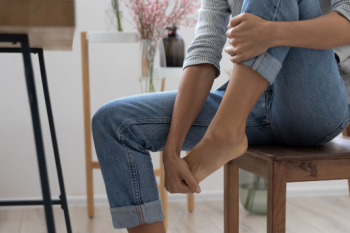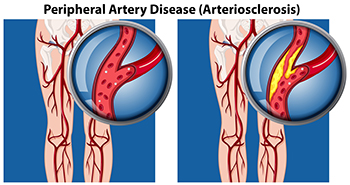Connect With Us
Blog

A newborn’s foot is soft, flexible, and still developing. At birth, the bones are not fully formed and are mostly made of cartilage, which allows the foot to adapt and grow. It is normal for baby feet to appear flat because the arches have not yet developed. Toes may be curled or turned slightly due to their position in the womb, and in most cases, these resolve naturally over time. Gentle movement, barefoot time, and avoiding tight shoes or socks help promote healthy development. While most newborn foot shapes and positions are harmless, certain conditions like clubfoot or metatarsus adductus may require early treatment. Regular check-ups can help ensure your baby’s feet are growing as expected. If you notice stiffness, unusual shape, or difficulty with movement, it is suggested that you see a podiatrist for a proper evaluation and peace of mind.
Congenital foot problems require immediate attention to avoid future complications. If you have any concerns, contact Michael Tomey, DPM of Cary Foot & Ankle Specialists. Our doctor can provide the care you need to keep you pain-free and on your feet.
Congenital foot problems are deformities affecting the feet, toes, and/or ankles that children are born with. Some of these conditions have a genetic cause while others just happen. Some specific foot ailments that children may be born with include clubfeet, polydactyly/macrodactyly, and cleft foot. There are several other foot anomalies that can occur congenitally. What all of these conditions have in common is that a child may experience difficulty walking or performing everyday activities, as well as trouble finding footwear that fits their foot deformity. Some of these conditions are more serious than others. Consulting with a podiatrist as early as possible will help in properly diagnosing a child’s foot condition while getting the necessary treatment underway.
What are Causes of Congenital Foot Problem?
A congenital foot problem is one that happens to a child at birth. These conditions can be caused by a genetic predisposition, developmental or positional abnormalities during gestation, or with no known cause.
What are Symptoms of Congenital Foot Problems?
Symptoms vary by the congenital condition. Symptoms may consist of the following:
- Clubfoot, where tendons are shortened, bones are shaped differently, and the Achilles tendon is tight, causing the foot to point in and down. It is also possible for the soles of the feet to face each other.
- Polydactyly, which usually consists of a nubbin or small lump of tissue without a bone, a toe that is partially formed but has no joints, or an extra toe.
- Vertical talus, where the talus bone forms in the wrong position causing other bones in the foot to line up improperly, the front of the foot to point up, and the bottom of the foot to stiffen, with no arch, and to curve out.
- Tarsal coalition, when there is an abnormal connection of two or more bones in the foot leading to severe, rigid flatfoot.
- Cleft foot, where there are missing toes, a V-shaped cleft, and other anatomical differences.
- Macrodactyly, when the toes are abnormally large due to overgrowth of the underlying bone or soft tissue.
Treatment and Prevention
While there is nothing one can do to prevent congenital foot problems, raising awareness and receiving neonatal screenings are important. Early detection by taking your child to a podiatrist leads to the best outcome possible.
If you have any questions please feel free to contact our office located in Cary, NC . We offer the newest diagnostic tools and technology to treat your foot and ankle needs.

Some people develop a hard lump under the toenail, often near the big toe. This bump, known as subungual exostosis, is an overgrowth of bone that can push the nail upward or make shoes feel uncomfortable. Over time, the pressure may lead to a painful ingrown toenail, a condition called chronic onychocryptosis. This happens when the nail grows into the surrounding skin, causing swelling, redness, and sometimes infection. The bone growth and the ongoing nail problem often go hand in hand, making the toe sore and hard to treat at home. A podiatrist can take X-rays to confirm the bone growth and suggest the best treatment, which may include minor surgery to remove the bump and help the nail grow normally again. If you have a painful or abnormal toenail that does not get better, it is suggested that you see a podiatrist for a proper diagnosis and appropriate treatment.
Toe pain can disrupt your daily activities. If you have any concerns, contact Michael Tomey, DPM of Cary Foot & Ankle Specialists. Our doctor can provide the care you need to keep you pain-free and on your feet.
What Causes Toe Pain?
Most severe toe pain is caused due to a sports injury, trauma from dropping something heavy on the toe, or bumping into something rigid. Other problems can develop over time for various reasons.
Toe pain can be caused by one or more ailments. The most common include:
- Trauma
- Sports injury
- Wearing shoes that are too tight
- Arthritis
- Gout
- Corns and calluses
- Hammertoe
- Bunions
- Blisters
- Ingrown toenails
- Sprains
- Fractures (broken bones)
- Dislocations
When to See a Podiatrist
- Severe pain
- Persistent pain that lasts more than a week
- Signs of infection
- Continued swelling
- Pain that prevents walking
Diagnosis
In many cases the cause of toe pain is obvious, but in others, a podiatrist may want to use more advanced methods to determine the problem. These can range from simple visual inspections and sensation tests to X-rays and MRI scans. Prior medical history, family medical history, and any recent physical traumatic events will all be taken into consideration for a proper diagnosis.
Treatment
Treatments for toe pain and injuries vary and may include shoe inserts, padding, taping, medicines, injections, and in some cases, surgery. If you believe that you have broken a toe, please see a podiatrist as soon as possible.
If you have any questions please feel free to contact our office located in Cary, NC . We offer the newest diagnostic tools and technology to treat your foot and ankle needs.

Peripheral artery disease, or PAD, is a condition in which narrowed arteries reduce blood flow to the limbs, most commonly affecting the legs and feet. It occurs due to a buildup of fatty deposits in the arteries, a process known as atherosclerosis. Symptoms often include leg pain or cramping during walking, known as claudication, which improves with rest. Other signs may include numbness, weakness, slow-healing wounds, and a change in skin color or temperature. Causes of this condition include smoking, diabetes, high blood pressure, and high cholesterol, which contribute to artery damage. Poor circulation from this disease increases the risk of infections and complications. If you have symptoms of this condition, it is suggested that you consult a podiatrist who can guide you toward relief and treatment tactics.
Peripheral artery disease can pose a serious risk to your health. It can increase the risk of stroke and heart attack. If you have symptoms of peripheral artery disease, consult with Michael Tomey, DPM from Cary Foot & Ankle Specialists. Our doctor will assess your condition and provide you with quality foot and ankle treatment.
Peripheral artery disease (PAD) is when arteries are constricted due to plaque (fatty deposits) build-up. This results in less blood flow to the legs and other extremities. The main cause of PAD is atherosclerosis, in which plaque builds up in the arteries.
Symptoms
Symptoms of PAD include:
- Claudication (leg pain from walking)
- Numbness in legs
- Decrease in growth of leg hair and toenails
- Paleness of the skin
- Erectile dysfunction
- Sores and wounds on legs and feet that won’t heal
- Coldness in one leg
It is important to note that a majority of individuals never show any symptoms of PAD.
Diagnosis
While PAD occurs in the legs and arteries, Podiatrists can diagnose PAD. Podiatrists utilize a test called an ankle-brachial index (ABI). An ABI test compares blood pressure in your arm to you ankle to see if any abnormality occurs. Ultrasound and imaging devices may also be used.
Treatment
Fortunately, lifestyle changes such as maintaining a healthy diet, exercising, managing cholesterol and blood sugar levels, and quitting smoking, can all treat PAD. Medications that prevent clots from occurring can be prescribed. Finally, in some cases, surgery may be recommended.
If you have any questions, please feel free to contact our office located in Cary, NC . We offer the newest diagnostic and treatment technologies for all your foot care needs.

